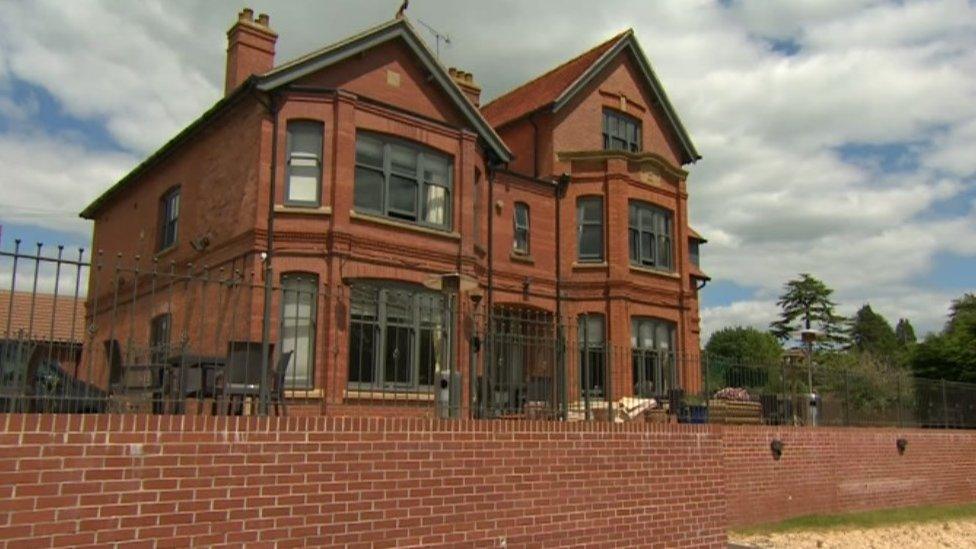Crypto for care homes - one bad idea
- Published

Carlauren care homes wanted to create a crypto-currency that residents would buy into
Back in April, I wrote about an unusual scheme that saw a care home organisation create its own crypto-currency. Carlauren Care wanted residents and investors to use the currency to buy rooms in its upscale homes and what it called care "resorts."
The owner, Sean Murray, told me there was a unique feature to his Carlauren Coins, priced at £70 apiece - the company would buy them back any time at £63, meaning there were none of the risks associated with wildly volatile crypto-currencies.
He also insisted that although his initial coin offering was aiming to raise £35m, his company didn't really need the money - or, as a statement from his PR agency put it: "Unlike other offerings, Carlauren Group as a company has no current need to raise monies for its business."
When I suggested to Mr Murray that his buyback guarantee would work only if his business did not run out of money, he laughed off that idea. "I'm a visionary," he told me and went on to outline his vision of transforming the care industry through his innovative crypto-currency scheme.
Spool forward a couple of months, and all is not well at the Carlauren Group.
Last week, one of its care homes, in Yeovil, Somerset, closed after staff claimed they had not been paid for a month. Carlauren said it was having "serious cash flow problems". The residents of Tyndale House were given just 28 days to find somewhere else to live.
At this point, I contacted Sean Murray again to ask him how a well funded business had turned into a company that could not even pay vital staff. I also wanted to know whether the buyback guarantee for his coins still stood - after all, I had paid £70 for one. But answers came there none.
So, I went to the Carlauren website to find out more. Now, while the Carlauren Group dates back to 2015 only, it has built a complex web of companies.
As well as care homes, it has a hotels division, a travel business, even Carlauren Aviation. This turns out to be one corporate jet based in Bournemouth and available to charter - though, when I rang the number listed on the website, it was permanently engaged.
But back to the care homes. There are only two listed on the website - Tyndale House and another Somerset home, Hurst Manor. But it turns out that this too is closed.

Crypto-currencies are finding roles in many sectors of the business world
Then, an organisation representing unhappy investors in Carlauren got in touch. It forwarded the company's latest newsletter for investors, which first sought to reassure them, then dropped this bombshell: "Carlauren Care Ltd subsidiary has now formally closed due to the losses incurred over the past two years, which are well in excess of £700,000 and which we no longer wish to fund. "
The newsletter also revealed Tyndale House was being converted into a hotel - somehow there are funds for that, maybe because labour costs had been cut.
It added: "We have now reduced our annual wage commitment by £1.3m.
"This aggressive restructuring has had an adverse effect on the companies due to disgruntled staff contacting local media in order to express themselves.
"We would ask that if and when any adverse information filters through the media channels to you, that you consider the material fruitful effect that our decisions have had and continue to have on our cash flow, which ultimately will benefit you, our clients."
The clients will, however, have to wait for this "fruitful effect".
Investors promised a guaranteed 10% per annum return on the rooms they had purchased in Carlauren properties are now being told those returns will be sharply reduced - though that will be temporary.
Eventually, Sean Murray did come back with replies to my questions.
He said: "We were well funded in March but due to market changes with third parties, our income changed.
"Wages were decreased in order to maintain the jobs of the other 350 staff we employ."
He said the crypto-currency plan was "on hold" but insisted the buyback guarantee still stood.
In summary, Carlauren launched a crypto-currency as a means to pay for rooms in its care homes and resorts but has now got out of the care home business and is running out of cash.
Its investors are angry because they have not got the returns they were promised, staff have not been paid, the few residents of its one care home have had to move at short notice - and, least important of all, I'm still not entirely sure the £70 I paid for my C-Coin was a good investment.
Back in April, I thought selling crypto-currency for care home rooms was a bizarre and rather dubious idea. Now, I'm certain of it.
- Published2 July 2019

- Published3 April 2019
